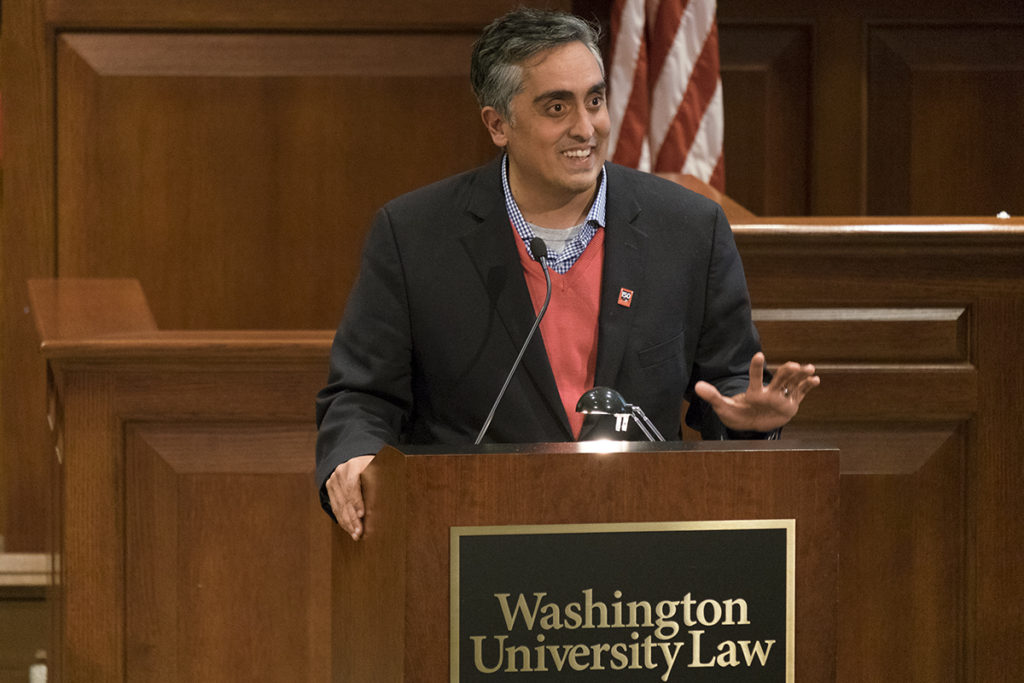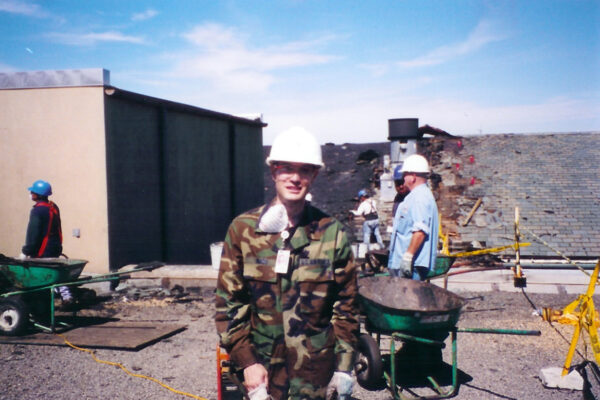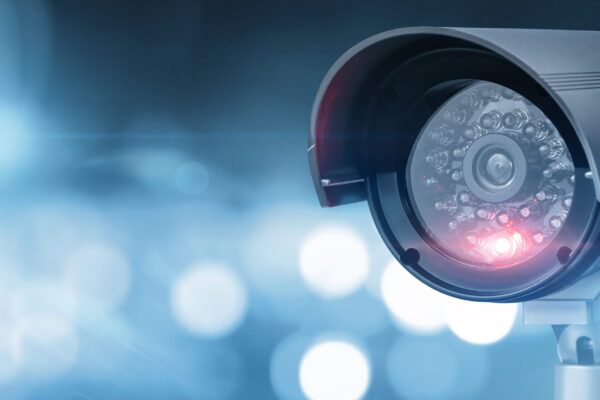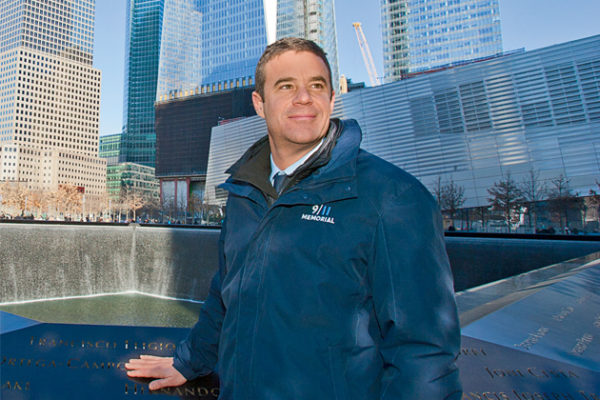What is your memory of 9/11?
At Washington University in St. Louis, Rob Wild, then a Residential Life staffer, remembers stunned students in the lobby of his South 40 office watching the World Trade Center towers fall. Kathy Steiner-Lang, longtime director of the Office for International Students and Scholars, remembers frantic calls from parents in India, China and beyond. And Brian Hamman, then a Student Life editor and senior, remembers hearing the name Osama bin Laden for the first time.
“Someone said something about Osama bin Laden and I was like, ‘Who?’ I didn’t even know what those words meant,” Hamman said.
Hamman also recalls the candlelight vigil led by then-Chancellor Mark S. Wrighton and Wayne Fields, now the Lynne Cooper Harvey Distinguished Chair Emeritus in English in Arts & Sciences.
“It is not enough that we live through the coming days,” Fields told the crowd. “We must come through this together, whole and complete. This, as much as justice, do we owe those who are the most wounded, to those who have died.”
“Wayne Fields was dad to all of us that night,” recalled Hamman, now senior vice president for product engineering at The New York Times, where some journalists still have the gas masks they were given after 9/11.
The vigil closed a day of shock, confusion and tears. Born in an era of relative peace and prosperity, millennial students had never witnessed such devastation. Yes, there had been the Challenger explosion and the Oklahoma City bombing. But the 9/11 attacks were more deadly by orders of magnitude — nearly 3,000 killed and many thousands more injured.
“We had a lot of students who had parents and family members who worked in and near the World Trade Center and in the Pentagon,” said Wild, today the associate vice chancellor for student affairs and dean of students. “Watching the updates was terrifying for them, really for all of us.”
Arsalan Iftikhar, then a law student and resident adviser for the Village, experienced a different type of sadness. Yes, he mourned the victims, but he also feared for his residents, half of whom, like him, were Muslim.
“Islamophobia didn’t start on 9/11, but I understood immediately our lives would now be very different than they had been on Sept. 10,” Iftikhar said.
In many respects, Washington University was lucky. The city was spared and, in the end, no student lost a close family member in the attacks.
Still, students suffered. For his PhD dissertation, Wild interviewed 50 Washington University students in 2004 about the immediate and ongoing impact of 9/11. Wild found 50% experienced symptoms of depression after the attacks and 25% saw their grades slide. University mental health services experienced a 20% spike in patients.
“In the months afterwards, students experienced vicarious trauma — fear of flying, fear of being in public places,” Wild recalled.
Many international students also feared leaving campus. Perceived as “others,” they were subject to profiling and insults.
“There were incidents of students from Latin America, India, the Middle East, even China being told, ‘Go home,’ when they were out in the community,” said Steiner-Lang, who now serves the MyDay initiative. “Many students of color just felt safer keeping a low profile.”

And, yet, Wild did find one positive effect. Students reported 9/11 influenced their studies and career choices and prompted them to serve their community.
“The energy, passion and desire to not only understand what happened and why but also to figure out a peaceful means of preventing future violence was extremely evident in the population,” Wild wrote.
“There was not a lot of student activism at the time, but after the attacks you started to see a greater willingness to get involved,” Wild said. “We are in a very different generational moment. And I don’t know if you can credit 9/11 for the student activism you see today, but there was certainly a shift from the apathy of my own Gen X generation.”
Few students were more civically engaged than Iftikhar, though, in honesty, he was already destined to be an activist. In 2000, Iftikhar had launched the St. Louis chapter of the Council on American-Islamic Relations (CAIR) and was studying to be a human and civil rights lawyer.
On 9/11, he penned a statement condemning the attacks and sent it to newspapers nationwide. Soon, Iftikhar was appearing on the Today show, CNN, Fox News and other television and radio programs where he denounced the terrorists but defended his faith. Sadly, and predictably, death threats followed. Wrighton rushed to provide Iftikhar 24-hour security, and the university took down its online phone directory.

“When you appear on Fox News with Bill O’Reilly as the archetypal Muslim guy, you can expect that all of the hatred and animosity people feel toward Muslims will be directed squarely on you,” Iftikhar said. “But thanks to (now-retired Washington University Police Chief) Don Strom, who became my friend, I never felt unsafe. This is where alliances come into play and a university really shows its mettle. The university showed such institutional compassion.”
Iftikhar despairs over the fate of Muslims worldwide — the genocide in Myanmar, the internment camps in China, the ongoing bigotry in America. And still, he tries to engage those who reject the beliefs and culture of some 2 billion people.
“You cannot be a human rights lawyer without having a great love for humanity,” said Iftikhar, who will participate virtually in the School of Law’s Public Interest Law & Policy Speaker Series on Oct. 5 to discuss his latest book, “Fear of a Muslim Planet.”
“In a time when our world is literally in flames, there are far too few people with buckets of water,” he said. “If I can carry one bucket to help someone else anywhere in the world — to give humanity to people who are denied it — then I am honored to do it.”




